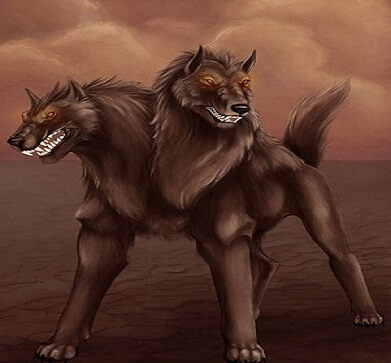Orthrus
The two-headed, serpent-tailed dog
A two headed dog tasked with guarding a huge herd of red cattle, he was killed by Hercules who then kept all the cattle as proof of his victory.
In Greek mythology, Orthrus (Greek: Ὄρθρος, Orthros) or Orthus (Greek: Ὄρθος, Orthos) was a two-headed dog who guarded Geryon's cattle and was killed by Heracles. He was the offspring of the monsters Echidna and Typhon, and the brother of Cerberus, who was also a multi-headed guard dog.
According to Hesiod, Orthrus was the father of the Sphinx and the Nemean Lion, though who Hesiod meant as the mother, whether Echidna, the Chimera, or Ceto, is unclear.
Killed by Hercules
Orthrus and his master Eurytion were charged with guarding Geryon's herd of red cattle in the "sunset" land of Erytheia ("red one"), an island in the far west of the Mediterranean. Heracles killed Orthrus, and later slew Eurytion, and Geryon, before taking the red cattle to complete his tenth labor. According to Apollodorus Heracles killed Orthrus with his club, although in art Orthrus is often depicted pierced by arrows.
The poet Pindar refers to the "hounds of Geryon" trembling before Heracles. Pindar's use of the plural "hounds" in connection with Geryon is unique. He may have used the plural because Orthus had multiple heads, or perhaps because he knew a tradition in which Geryon had more than one dog.
Orthrus and Cerberus
Orthrus bears a close resemblance to Cerberus, the hound of Hades. The classical scholar Arthur Bernard Cook called Orthrus Cerberus' "doublet". According to Hesiod, Cerberus, like Orthrus was the offspring of Echidna and Typhon. And like Orthrus, Cerberus was multi-headed. The earliest accounts gave Cerberus fifty, or even one hundred heads, though in literature three heads for Cerberus became the standard.
However, in art, often only two heads for Cerberus are shown. Cerberus was also usually depicted with a snake tail, just as Orthrus was sometimes. Both became guard dogs, with Cerberus guarding the gates of Hades, and both were overcome by Heracles in one of his labours.













